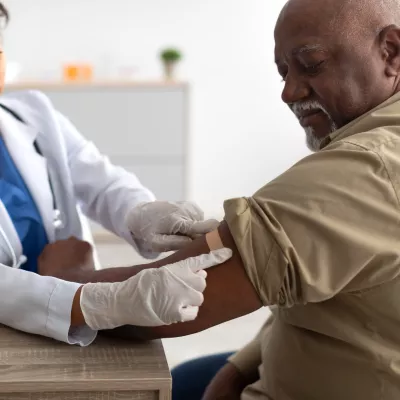- AdventHealth

Choose the health content that’s right for you, and get it delivered right in your inbox.
You've probably felt a flutter in your chest or your heart skipping a beat at some point in your life. It's very common and usually not serious. But sometimes, an irregular heartbeat can be a symptom of a condition like atrial fibrillation (AFib). AFib can lead to serious health problems, like a stroke, if left untreated. AFib causes about 1 in 7 strokes, and some studies have shown that people with AFib are about five times more likely to get a stroke than people who don't have it.
Keep reading to learn more about the signs of AFib and stroke and what to do if you or a loved one experiences symptoms.
What Is Atrial Fibrillation (AFib)?
AFib is one of the most common types of heart arrhythmias. If you have AFib, your heart beats much faster than normal. It also beats irregularly, which means your body doesn't get enough blood. Atrial fibrillation can cause symptoms such as:
- Chest pain
- Dizziness or fainting
- Fatigue
- Rapid or irregular heartbeat
- Shortness of breath, especially when lying down
How Does AFib Lead to a Stroke?
A stroke occurs when blood flow to part of the brain is significantly reduced or blocked, most commonly by a blood clot. With AFib, the blood may not pump properly out of the heart, which may cause it to pool and form a clot. This clot can then travel to the brain and block blood flow to part of the brain, resulting in a stroke.
Watching Out for a Stroke: Know the Acronym B.E. F.A.S.T.
To identify the signs and symptoms of a stroke, remember the acronym B.E. F.A.S.T., which stands for:
Balance: Does the person have trouble with balance or coordination?
Eyes: Is the person experiencing sudden blurring or loss of vision in one or both eyes?
Face: When the person smiles, does one side of the face droop?
Arms: When the person raises both arms, does one sink back down?
Speech: Is the person's speech slurred? Can they repeat a simple sentence?
Time: If the person has any of these symptoms, call 911 immediately.
When you notice stroke symptoms in a loved one, remember to note when you first noticed the symptoms. Knowing the onset time can help doctors better treat your loved one.
Fast Treatment Is Lifesaving Treatment
With a stroke, the sooner you seek medical attention, the better your chances for survival and recovery. By getting care quickly, our physicians and ER experts can give you or a loved one a special medicine that helps restore blood flow to the brain and stops further damage. This quick treatment is the first step on the journey to heal, recover and get back to the activities you love.
If you believe you or a loved one has AFib, schedule an appointment with one of our heart experts to get the treatment you need.



